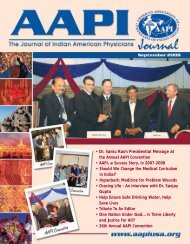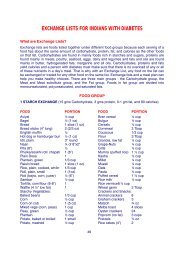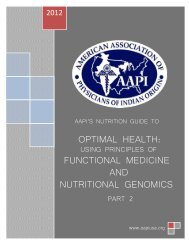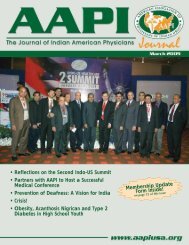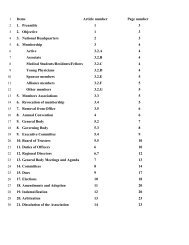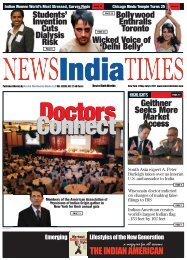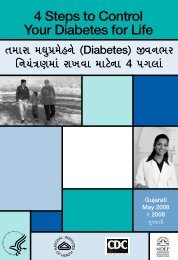functional medicine and nutritional genomics - American Association ...
functional medicine and nutritional genomics - American Association ...
functional medicine and nutritional genomics - American Association ...
Create successful ePaper yourself
Turn your PDF publications into a flip-book with our unique Google optimized e-Paper software.
AAPI’S NUTRITION GUIDE TO OPTIMAL HEALTH: USING PRINCIPLES OF FUNCTIONAL MEDICINE AND NUTRITIONAL GENOMICS<br />
‚Soft belly‛ is, I explain, an antidote to the fight<br />
or flight <strong>and</strong> stress responses, which figure<br />
prominently in the development <strong>and</strong> deepening of<br />
depression. Soft belly brings more oxygen to the<br />
lungs <strong>and</strong> stimulates the vagus nerve, which is<br />
central to relaxation. Slowly, I tell Theresa, the<br />
relaxation of the belly will spread to the other<br />
muscle groups as well.<br />
I explain to Theresa that though the research<br />
studies are most often done on 30-40 minutes a<br />
day of meditation, just a few minutes several<br />
times a day will help balance her physiologically,<br />
slow her anxious, pressured thought patterns, <strong>and</strong><br />
give her a little more perspective on her life.<br />
Equally important, as she sees she has the<br />
capacity to help herself, she will be overcoming<br />
the helplessness <strong>and</strong> hopelessness that are<br />
hallmarks of depression. I add ‚Soft Belly 3-5<br />
minutes, 3-5 times a day‛ to Theresa’s<br />
Prescription for Self-Care.<br />
I do Soft Belly along with Theresa <strong>and</strong> with all<br />
my patients. It’s of course helpful for me to be as<br />
relaxed <strong>and</strong> open as possible in my sessions. It<br />
also conveys an important message to my<br />
patients: We are on this journey together. I’m not<br />
an observer. I’m here with you, learning as well<br />
as teaching, experiencing life, <strong>and</strong> dealing with my<br />
own stress along with you. Dealing with<br />
depression <strong>and</strong> its challenges <strong>and</strong> with stress,<br />
generally is, I am recognizing <strong>and</strong> admitting, not<br />
separate from our lives- an extraordinary response<br />
to a pathological situation - but an ordinary <strong>and</strong><br />
ongoing part of them.<br />
We speak in the weeks ahead about the historical<br />
context of Theresa’s depression- her mother’s<br />
coldness; her isolation as a young black girl in a<br />
still segregated, white southern community; her<br />
tendency to take responsibility for the emotional<br />
lives of others-- her parents first, then her<br />
employees <strong>and</strong> lovers. Still, I am continually<br />
bringing our focus back to what is happening right<br />
now - how present feelings reflect past<br />
disappointments, <strong>and</strong> how she can relax with,<br />
learn from, <strong>and</strong> move through them. If she were<br />
to ask, I would explain that this is a meditative,<br />
present-oriented approach to psychotherapy.<br />
109<br />
Theresa, significantly more relaxed as well as<br />
reassured after our first session, felt encouraged<br />
<strong>and</strong> supported by the Prescription for Self-Care.<br />
Each week, I ask her about her progress <strong>and</strong><br />
express appreciation for what she is doing well,<br />
while not being dismayed by what has been too<br />
difficult, or what she's ignored or neglected. Our<br />
work is not about her ‚good‛ or ‚poor‛<br />
compliance-what an ugly, condescending word -<br />
but about what she can learn from difficulties,<br />
avoidance, <strong>and</strong> defeats as well as from ‚success.‛<br />
Sometimes patients who seem originally committed<br />
to this Unstuck approach grow discouraged <strong>and</strong><br />
are reluctant to pursue it. Nagging doubts remain<br />
about whether antidepressants might be the best<br />
<strong>and</strong> easiest answer, after all, or at least a<br />
necessary precondition for improvement <strong>and</strong><br />
therapy. I respond with information on the most<br />
recent meta-analyses of drug research, which<br />
show that when unpublished negative studies are<br />
included along with positive, published ones, drugs<br />
are little if any better than placebos. I tell patients<br />
that I’m not ‚against‛ the drugs—I just see them,<br />
with their uncertain benefits, significant side effects<br />
<strong>and</strong> potential for habituation, as a last resort, not<br />
a first choice.<br />
Like many depressed people, expecting to get a<br />
prescription but not much more in the way of<br />
attention, Theresa is afraid of being ‚left alone‛<br />
with her depression. I assure her that I myself<br />
have been on the journey through <strong>and</strong> beyond<br />
depression <strong>and</strong> that I will be there with her at<br />
every step of her journey. I make sure she<br />
underst<strong>and</strong>s we’ll have regular appointments - a<br />
usual feature of psychotherapy, but a significant<br />
departure for people who are used to seldom<br />
seen, drug-prescribing physicians. I also tell my<br />
patients they can call me anytime--<strong>and</strong> find that<br />
this reassurance is itself powerful <strong>medicine</strong>:<br />
Knowing they can call me, that I am always<br />
there, almost no one does.<br />
I also begin, in our first or second session, to<br />
directly address the comprehensive biological<br />
dimensions of depression. ‚Depression is not a<br />
disease,‛ I say, ‚but diseases of a variety of<br />
kinds, <strong>and</strong> imbalances in biochemistry <strong>and</strong> nutrition<br />
2012






